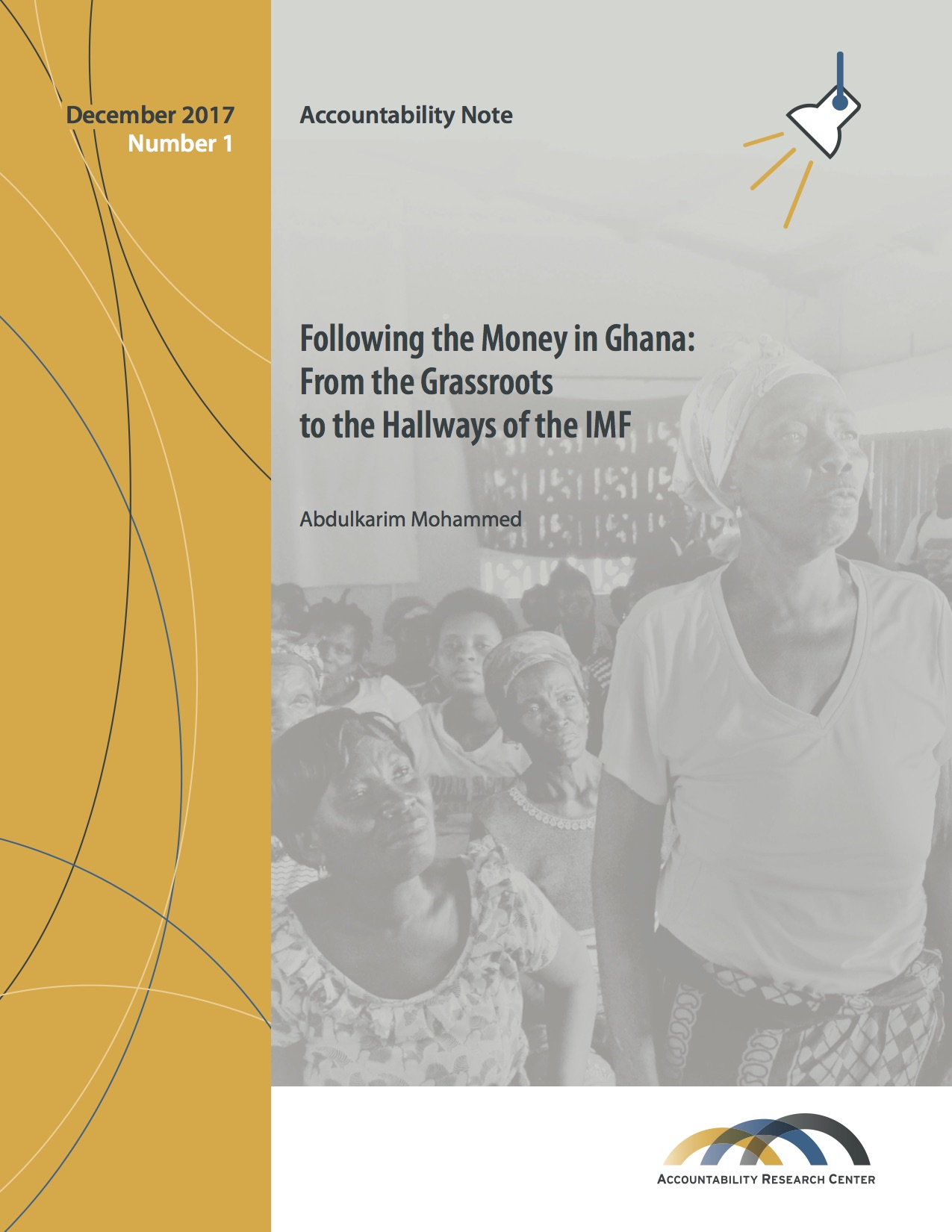
Following the Money in Ghana: From the Grassroots to the Hallways of the IMF
Date: December 2017
Authors: Abdulkarim Mohammed
Publication type: Accountability Note
Published by: Accountability Research Center
Between 2011 and 2014, Ghana went from boasting the world’s fastest growing economy to requiring a bailout from the International Monetary Fund (IMF). While a global downturn in commodity prices precipitated the fall, a lack of accountability in how public finances have been managed has been at the heart of the problem. Fiscal indiscipline, fueled by a lack of oversight and rampant corruption, left the government unable to mount an effective response during lean economic times. Oxfam and its civil society partners in Ghana were worried that everyday Ghanaians would be left shouldering the burden of the economic crisis. Moreover, Ghanaians worried that their concerns and aspirations would not be represented in the high-level negotiations on the bailout between the Government of Ghana and the IMF. To address these concerns Oxfam and its partners coordinated a multi-level advocacy campaign. The campaign drew together a diverse coalition of civil society—from community activists to globally influential think tanks—able to represent and articulate local level concerns and project a united voice at the national and global levels. This novel approach proved highly successful in driving important changes in policy and practice that have enhanced accountability, fiscal responsibility, and citizens’ participation. The campaign not only contributed to improving the laws governing how public finances are managed in Ghana, but also helped to increase pro-poor spending and protect crucial social services.
- Establish accessible communication and sustained dialogue within a diverse coalition.
- Use global institutions as strategic levers for top-down accountability.
- Invest in citizens’ engagement in policies and implementation over the longer-term.
Figure 1. Theory of Change and Action 
Abdulkarim Mohammed Abdulkarim Mohammed is Program Manager of Active Citizenship & Accountable Governance, based in Ghana. In this capacity, he leads Oxfam’s efforts in Ghana to increase revenue transparency and state accountability through citizen’s influence over public finances, particularly those derived from extractive industries and foreign assistance. In addition, he leads advocacy efforts for political reforms and citizen-driven social accountability aimed at consolidating Ghana’s democratic experiment. His work involves capacity building of local partners in setting advocacy agendas, policy targets and budget tracking, as well as advocacy on global platforms for implementation of global norms in Ghana and across the region. He recently supported the formation of a CSO platform to engage the IMF on a bailout program for the government of Ghana that secured unusually significant social safety nets and also led to the passage of a long pending petroleum exploration and production bill, as well as a new public nance management law. He previously worked with the Canada-based Parliamentary Centre as Governance Advisor on Extractives and Environment and as Program Officer, where he supported parliamentary review and passage of Ghana’s Petroleum Revenue Management Act—widely touted as model policy in the region, the rejection of a awed Exploration and Production Bill, and the establishment of an independent regulatory body (the Petroleum Commission of Ghana). He also worked with the Danish International Development Agency, where he supported Judicial Service, Ghana’s public service institution responsible for the administration of the courts and tribunals. Abdulkarim holds a Master of Science degree in Development Policy and Planning from the Kwame Nkrumah University of Science and Technology in Kumasi, Ghana and a Certificate in Petroleum Policy and Resource Management from PETRAD in Norway. Twitter: @paakarim.
